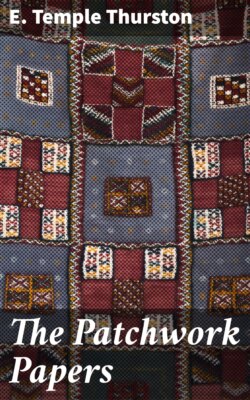Читать книгу The Patchwork Papers - E. Temple Thurston - Страница 8
ОглавлениеIII
THE WONDERFUL CITY
I saw a wonderful city to-day. Rows of houses there were. Domes of great buildings with their dull brown roofs lifted silently into the sky. Long streets in tireless avenues led from one cathedral to another; some with the straightness of an arrow, others twisting and turning in devious ways, yet all leading, as a well-planned street should lead, to the crowning glory of some great edifice.
By the chance of Destiny I stood above it all and looked down. It was strange that only the night before I had been dreaming that I was in the City of New York, with its vast maze of buildings leaping to the sky. In my dream I had stood wrapt in amazement. But I was silent with a greater astonishment here. For as I gazed upon it, there had come a man to my side and, seeing the direction of my eyes, he had said—
“There warn’t a trace o’ that there last night.”
“Not a trace?” said I. And I said it in amazement, for frankly I disbelieved him.
“Not a trace,” he repeated solemnly.
“All that built in one night?” I asked again.
“In one night,” said he.
“But doesn’t it astound you?” said I. I tried to lift his lethargy to the wonderment and admiration that was thrilling in my mind.
“It do seem strange,” he replied, “when yer come to think of it.”
“Well, then, come to think of it!” I exclaimed. “You can’t do better than find the world strange. Come to think of it and, finding it strange, you’ll come to believe in it!”
He stared at me with solemn eyes.
“Look at the dome of that cathedral,” I went on. “Could you set to work and, in a single night, build a vast piece of architecture like that, so many times higher than yourself?”
“That ain’t no cathedral,” said he.
“Have you ever seen a cathedral?” I asked.
“No.”
“Well, then, how do you know it isn’t?”
He could give me no reply and I continued in my enthusiasm—
“Look at that street, cut through all obstacles, leading straight as though a thousand instruments of latter-day science had been used in the making of it. Look at this avenue turning to right and to left. Do you see that great cluster of buildings, a very parliament of houses, set round a vast space that would shame the great square of St. Peter’s, in Rome. Only look at the——”
I turned round and he had gone. I could see his figure retreating in the distance. Every moment he turned his head, looking round, as one who is pursued yet fears to show his cowardice by running away. He thought I was mad, I have no doubt. Every one thinks you mad when you say the moon is a dead world or the sun is a fiery furnace. To be sane, you must only remark upon the coldness of the moon, or the warmth of the sun. To be sane, you must speak of the things of this world only in terms of people’s bodies. They do not understand unless.
And so, when the man left me, I was alone, looking over the wonderful city. For an hour then, I amused myself by naming the different streets, by assigning to the various buildings the uses to which it seemed they might be put.
That huge edifice with the cupola of bronze was the Cathedral of Shadows, where prayers were said in darkness and never a lamp was lit. The street which led to its very steps, that was called the Street of Sighs. Here, in a lighter part of the city, approached to its silent doors by Tight Street, was the Bat’s Theatre, where you could hear, but never see the performance as it progressed. A little further on there was Blind Alley—a cul-de-sac, terminating in a tiny building, the Chapel of Disappointment. There was the Avenue of Progress, the Church of Whispers, the Bridge of Stones and a thousand other places, the names of which went from me no sooner than they crossed my mind.
It may be possible to build a wonderful city in a night. I only know how utterly impossible it is to name all its streets and its palaces in one day.
And then, while I was still thus employed, I saw the man returning with a jug of beer.
I nodded to the vessel which he carried in his hand.
“You don’t need to think about that,” said I, “to understand it.”
A broad grin spread across his face. He had found me sane after all. I had talked about beer in terms of bodily comfort.
“I need to drink it,” said he with a laugh.
“You do,” said I.
Then, as if to appease me for the moment e’er he passed on his way, he returned to our former subject and, with a serious voice, he said—
“When yer come to think of it,” said he, “it do seem wonderful that them moles is blind.”
“Not so blind,” said I, looking down at the wonderful city, “not so blind as those who can see.”
He thought I had gone mad again, and he walked away with his jug of beer.
